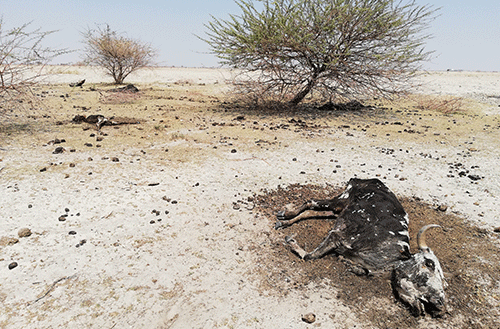Absalom Shigwedha
ONLY 45% of Namibians have heard of climate change in 2021 and 2022, according to a study conducted through a project on Social Impacts of Climate Change in Namibia.
This was said by Vanessa Simataa, one of the people involved in the implementation of the project on awareness creation of social climate change impacts in Namibia at a three-day Transdisciplinary workshop on Awareness Creation of Social Climate Change Impacts in Namibia, which started in Windhoek yesterday.
Simataa and her colleagues, Sarah Luttich and Mario Sikukuta, gave a joint presentation on the study on Perceptions of Climate Change Awareness in Namibia conducted in 2021 and 2022. She said the study revealed that only 45% of Namibias heard of climate change in the two years. Simataa said 18% of people interviewed spoke of increasingly devastating floods while 39% spoke of increasing droughts.
Simataa said the study has found that there was a gap in knowledge to promote climate information in areas of their study. The people interviewed were small-scale farmers and the study was conducted in Kavango East, Zambezi, Kunene and Omusati regions. Sikukuta said some people interviewed during the study called on the government to assist them in setting up small-scale gardens (using conservation agriculture) to make them more resilient to climate change, while some called on the government to provide them with drought food packages.
He said some interviewees said they want the government to set up more green schemes in their areas as well as for the provision of climate change education as well as to spend enough time on data collection.
In their introductory joint presentation to the project, Luttich and Janek Reidel from the University of Marburg (Germany), which is also a partner in the project, Reidel said the project is aimed at highlighting the social dimension of climate change in Namibia, communication of the social consequences of climate change as a challenge in research and development as well as to promote bottom-up processes, initiatives by integrating different realities and focus of knowledge.
In a video clip shown by the two at the workshop, Namibia is heating up and this is set to lead to water stress, drought, reduction in agricultural production and thus leading to food insecurity. This will also have a negative impact on key economic sectors such as agriculture, tourism, and mining.
Reidel said there are two ways of addressing climate change which are adaptation and mitigation. The two approaches, he said, should work concurrently in the Global South.
Luttich said one of the challenges that led to not many people being unaware of climate change in Namibia is that many people look at climate change as something linked to global issues, not something affecting them.
The Namibia University of Science and Technology, through its Department of Land and Spatial Sciences, the Justus Liebig University, University of Marburg (both in Germany) in collaboration with the German Federal Ministry of Education and Research, funded the research project titled ‘Social Climate Change Impacts and Sustainability Innovation in Southern Africa and Northern America’ (Nisansa).
According to Luttich, under Nisansa, there are seven sub-projects and the seven are being implemented in Malawi and Namibia and entitled ‘Policy Advice Strategies for Climate Change Adaptation in International Cooperation in Namibia and Malawi’.
The workshop is aimed at engaging local and international stakeholders on how to promote climate change awareness campaigns for different settings in Namibia, to identify the land tenure and climate vulnerability relationship in Namibia, to strengthen local stakeholders for an exchange on climate change in urban and rural areas, climate change governance and climate change research and methodologies in Namibia.
* Absalom Shigwedha is a freelance journalist that specialises in agriculture and environment reporting.



